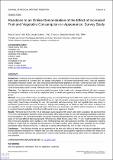Reactions to an online demonstration of the effect of increased fruit and vegetable consumption on appearance : survey
Abstract
Background : Inadequate fruit and vegetable consumption causes a considerable disease burden and premature mortality. Despite public health promotion of a healthy diet, the average consumption is still below recommended levels. Fruit and vegetable consumption influences human skin color, increasing red/yellow/orange pigment in the skin. Given that this color is deemed attractive and healthy-looking, the appearance benefit may motivate to eat more fruit and vegetables. Such appearance motivation could be particularly useful in young individuals who currently eat the least fruit and vegetables. Objective : Our objectives were to assess how widely the impact of diet on skin color is known within the UK and to compare the strength of motivation to eat fruit and vegetables based on health and appearance benefits among different demographic groups. Methods : Four groups of UK residents (N=200 per group) were recruited through the Prolific online platform. Groups comprised younger (aged 18-24) and older adults (aged 40-60) of low and high self-reported socioeconomic status (1-5 and 6-10 on a 10-point rating scale). Facial images simulating the skin color associated with low and high fruit and vegetable diets were shown to participants. Questionnaires were used to assess (1) background knowledge of the health and skin color effects of dietary fruit and vegetables, (2) the specific motivational impact of the skin color illustration, and (3) the relative importance of motivation to consume fruit and vegetables arising from health and skin color appearance benefits. Results : We found that 61% (n=487) of all participants were unaware of the dietary–skin color association. We also found that 57% (n=457) of participants found the simple demonstration of the dietary impact on skin color positively motivating to eat more fruit and vegetables. The visual demonstration was equally motivating for participants of high and low self-reported socioeconomic status (P=.63) and different ethnic backgrounds (White N=453, Black N=182, Asian N=87, P=.22). Health benefits from a diet high in fruit and vegetables were regarded as more motivating than skin color appearance benefits. The appearance-changing benefits of a high fruit and vegetable diet (compared to the health benefits) were relatively more important for the younger participants (Mann-Whitney U=96,263, P<.001) and for women (N=489) than for men (N=310, U=83,763, P=.01). Conclusions : These findings indicate that the promotion of the skin color effects of diets high in fruit and vegetables could provide additional motivation for a healthier diet. Our study indicates the broad appeal of appearance benefits from dietary fruit and vegetable (across ethnicity and socioeconomic status) and particularly amongst young adults where an inadequate diet is most prevalent.
Citation
Cairns , P , Ozakinci , G & Perrett , D I 2020 , ' Reactions to an online demonstration of the effect of increased fruit and vegetable consumption on appearance : survey ' , Journal of Medical Internet Research , vol. 22 , no. 7 , e15726 . https://doi.org/10.2196/15726
Publication
Journal of Medical Internet Research
Status
Peer reviewed
ISSN
1439-4456Type
Journal article
Description
Funding: British Academy Wolfson Research Professorship (grant number: WRP/2008/87) and University of St Andrews Knowledge Exchange and Impact Fund 2017/18.Collections
Items in the St Andrews Research Repository are protected by copyright, with all rights reserved, unless otherwise indicated.

